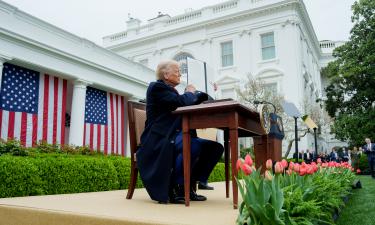Bolton’s case puts Bush and Senate in a stalemate
Senate Democrats twice have blocked John Bolton's confirmation as U.N. ambassador. Now U.S. President George W. Bush faces a politically thorny situation - and stark choices, says AP.
At a White House news conference Monday, George Bush sidestepped a question on whether he would appoint Bolton to the ambassador's post when Congress leaves Washington for a July 4 recess and hence left open the possibility of circumventing the Senate.
"It's time for the Senate to give him an up-or-down vote. Now," the president said.
But Democrats made clear they weren't budging and most stood together to defeat a Republican effort to force a final vote on Bolton. The Senate voted 54-38, six shy of the total needed to advance his nomination. The vote represented an erosion in support from last month's failed Republican effort.
"The republicans were six votes short, even though they have the majority in the senate," reports CBS News. "You can always block a vote as a minority if the majority can't get 60 votes. They were six votes short last night. They don't think they're going to get them. So now it is up to the president to do what he wants to do, even if only appointing Bolton for a short time."
Democrats have demanded that the administration check a list of 36 U.S. officials against names in secret national security intercepts that Bolton requested and received. They also want documents related to the preparation of testimony that Bolton planned to deliver - but ultimately never gave - in the House in July 2003 about Syria's weapons capability.
Democrats also criticize Bolton for his sometimes blunt comments about the United Nations, including a 1994 statement that "there is no such thing as the United Nations."
Mr. Bush has said Bolton, with a history of blunt talk and skepticism about the U.N.'s power, would lead an effort to overhaul the world body's bureaucracy and make it more accountable. Critics say Bolton, who has been accused of mistreating subordinates, would hurt U.S. efforts to work with the U.N. and other countries.
As CNN remarks, little has been said publicly about the contents of the intercepts from the NSA, the highly secretive intelligence agency that specializes in electronic eavesdropping. Sen. Joseph Biden of Delaware, the ranking Democrat on the Foreign Relations Committee, said Bolton was given the names of 19 individuals or companies whose communications were picked up by U.S. intelligence.
Biden suggested Bolton might have been seeking the names of Americans whose conversations were intercepted to assist in "intramural fights within the administration."
Bolton has told senators he needed the information for "context" and out of "intellectual curiosity," Biden said.
The stalemate has led to suggestions that Bush might circumvent the Senate by giving Bolton an interim appointment when Congress breaks for its Fourth of July holiday recess. Asked about that prospect in an interview with "Fox News Sunday," Secretary of State Condoleezza Rice said, "We'll see what happens this week."
President Bush could withdraw the nomination, authorize further concessions to Democrats over access to information they seek or bypass lawmakers altogether by appointing the former State Department official to the job temporarily without the Senate's OK. But any of those options could show Bush’s weakness as president as he confronts sagging poll numbers and fights to stave off a lame-duck label just six months into his final term.
A senior State Department official said Monday that such a move "is not under active consideration." But White House officials said Bush is keeping his options open, states CNN.
Nevertheless, such an appointment would be valid only through the next one-year congressional term. That would be until January 2007 in Bolton’s case.
Some Republicans urged Bush to continue fighting for Bolton rather than appoint him on his own during the upcoming Senate for fear of sending a weakened nominee to the United Nations. "That would not be in our best interest," said Senator Pat Roberts, a Republican and chairman of the Senate Intelligence Committee.
Subscribe to Pravda.Ru Telegram channel, Facebook, RSS!





